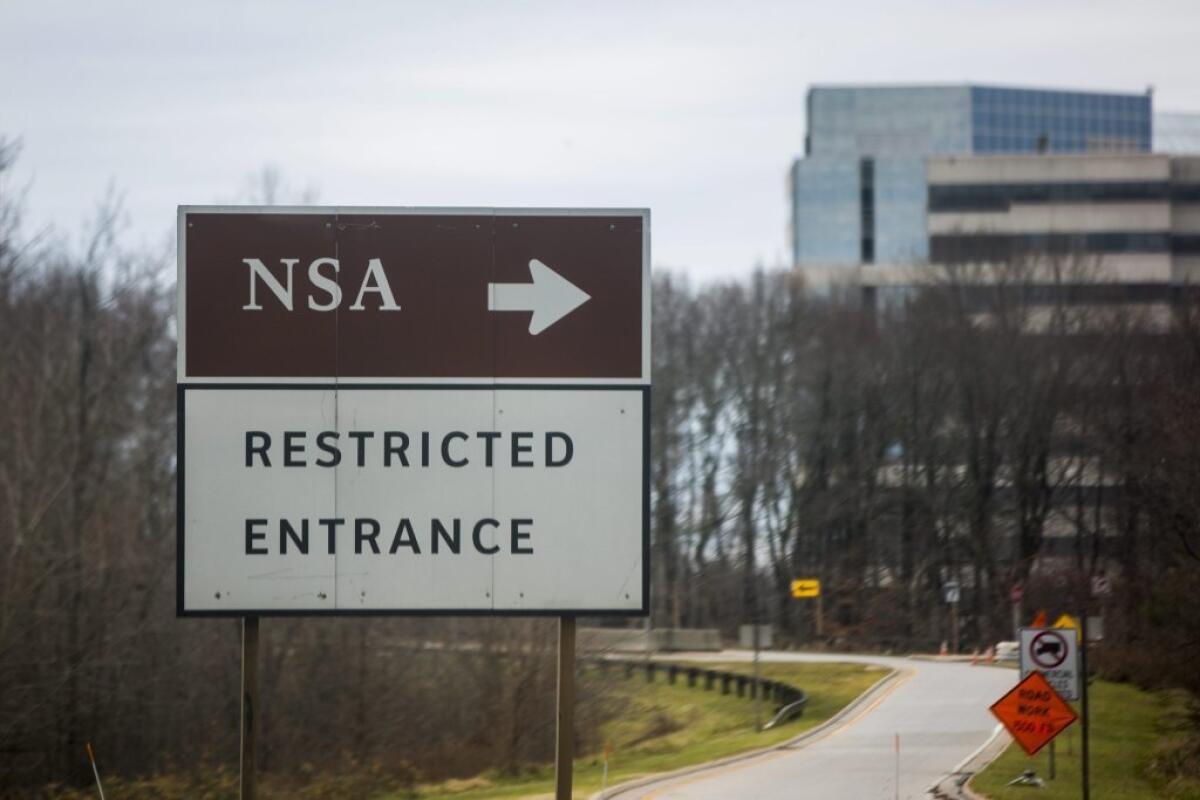Spy wars: Americans need to know more than Snowden has revealed

- Share via
Thanks to Edward Snowden, we know a lot about what the National Security Agency has secretly been up to. As a result, Congress, a U.S. district court judge and the White House are considering ways to rein in the agency and protect our privacy. But we have yet to hear answers to key questions about how our intelligence agencies use the NSA’s cache of data: Which Americans have been targeted, and why?
We know the NSA has compiled call records on virtually every American who has used a phone; vacuumed up Internet data such as chats, photographs, emails, videos and documents of targeted foreigners; and created a database from the “incidental collection” of Americans’ Internet data that it says it may search without a court order. In the process, the NSA repeatedly exceeded its restrictions. And, significantly, its work has been driven by requests from “customer” agencies such as the FBI and CIA.
The Obama administration says the NSA’s secret activities are legal and crucial to protecting the nation against terrorism. But similar national security claims led to granting our intelligence agencies great secrecy and power during the Cold War that in turn led to gross violations of our constitutional rights.
Only in the wake of the Watergate scandal and media reports based on leaks of classified information did Congress hold the first and, to date, the most thorough public hearings on intelligence activities with respect to the rights of Americans.
In the mid-1970s, the Church Committee, named for its chairman, Sen. Frank Church (D-Idaho), made shocking and still-relevant findings. It found that J. Edgar Hoover’s FBI spied on hundreds of thousands of Americans who dissented against government policy, on the pretext that they were part of a Kremlin-controlled plot.
The bureau went beyond surveillance to mount, in the committee’s words, a “sophisticated vigilante operation” called COINTELPRO to “disrupt” and “neutralize” dissent, turning counterintelligence techniques developed for use against foreign enemies on students protesting the Vietnam War, civil rights groups and nonviolent leaders such as Martin Luther King Jr.
FBI officials went so far as to foment violence between the Black Panthers and a rival black power group, United Slaves, in Southern California, the committee found, and then proudly claimed credit for shootings and beatings.
At the University of California, FBI files subsequently uncovered through the Freedom of Information Act show the bureau harassed Mario Savio, a leader of the 1964 Free Speech Movement; waged a concerted campaign to oust UC President Clark Kerr because FBI officials disagreed with his policies; and gave personal and political help to Ronald Reagan, who had been an FBI informer in Hollywood and as governor vowed to crack down on Berkeley protests.
The Church Committee also investigated NSA surveillance and its relationship to its “customer” agencies and their activities.
From 1967 until 1973, the committee said, the NSA targeted the international communications of some 1,200 Americans on a “watch list” of names, submitted mainly by the FBI and other agencies, who ranged from members of radical political groups to celebrities to “ordinary citizens involved in protests against their government.” Among those listed were King, Muhammad Ali and even Church.
These NSA intercepts were an integral part of massive domestic surveillance that targeted citizens because they exercised their constitutional rights, the committee reported. The FBI used the information to develop leads at the same time the bureau was conducting COINTELPRO; the CIA used it to spy on antiwar activists under its “questionable” Operation CHAOS; and the Army to improperly amass files on more than 100,000 U.S. citizens engaged in dissent.
In its defense, the NSA claimed that the communications of Americans had been collected “as an incidental and unintended act in the conduct of the interception of foreign communications.” Sound familiar?
It is past time for another Church Committee. Congress should promptly conduct hearings and demand to know not only what the NSA is collecting but how its customer agencies are using it:
• Is the NSA again monitoring American citizens and organizations engaged in dissent, such as the Occupy movement and other groups that have come under federal scrutiny?
• Is the agency watching immigrants in the U.S., such as Muslim communities that have been the scene of invasive FBI investigations?
• Is the NSA being deployed to gather intelligence from academic communities, which attract people of many creeds and are natural sites of dissent?
• Which Americans have the NSA’s customer agencies requested information about, and to what end?
Congress must be insistent, and it must use subpoena power, especially because intelligence officials have repeatedly misled Congress, the courts and the public about the NSA’s doings.
Snowden’s disclosures have spurred authorities to reconsider the scope of NSA surveillance, but history tells us real reform requires a public accounting of how intelligence was used in regard to Americans.
As the Church Committee concluded: “NSA’s vast technological capability is a sensitive national asset which ought to be zealously protected for its value to our common defense. If not properly controlled, however, this same technological capability could be turned against the American people, at great cost to liberty.”
Seth Rosenfeld is the author of “Subversives: The FBI’s War on Student Radicals, and Reagan’s Rise to Power,” winner of the 2013 Pen Center USA Award for research nonfiction.
More to Read
A cure for the common opinion
Get thought-provoking perspectives with our weekly newsletter.
You may occasionally receive promotional content from the Los Angeles Times.










